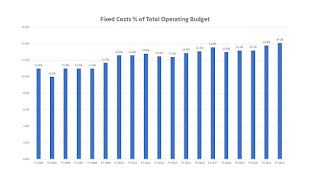As part of the continuing series to prepare for the Finance Committee budget hearings (which begin next week) and the Town Council budget hearings (in May), check out the link to the details on the history of the fixed costs year over year from FY 2004 to FY 2022.
- Appendix C3 - Historic Data: Fixed Cost
The chart depicts the fixed costs of the budget year by year from FY 2004 to FY 2022.
What are the fixed costs?
- Liability Insurance
- Employee Benefits:
- Pensions
- Health/Life Insurance/non school
- Retired Teacher Health Ins
- Non GIC - School Retirees
- Workers Compensation
- Unemployment Compensation
- OPEB
- Medicare
 |
| What are the fixed costs of the Town of Franklin budget? |
Prior posts
Town of Franklin - budget growth and split between municipal and schools - FY 2012 to FY 2022
School budget, executive summary by School Superintendent Sara Ahern
Executive summary by Town Administrator Jamie Hellen
https://www.franklinmatters.org/2021/04/franklin-public-schools-fy-2022-annual.html
Link to Town of Franklin budget proposal for FY 2022
https://www.franklinmatters.org/2021/04/fy-2022-town-of-franklin-budget-proposal.html
https://www.franklinmatters.org/2021/04/fy-2022-town-of-franklin-budget-proposal.html